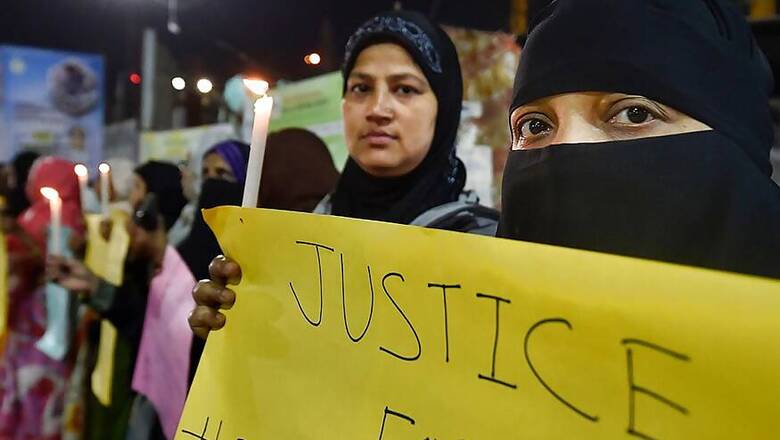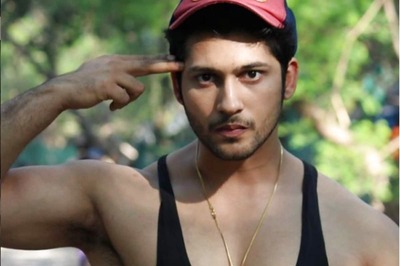
views
The 2012 Delhi gang-rape victim had a name. Her mother, Asha Devi, even announced it, saying she was not ashamed. But in 2013, when USA’s Secretary of State's International Women of Courage Award conferred upon women around the globe who have exemplified exceptional courage at great personal risk, the honour citation for the 2012 Delhi rape victim mentioned her as an ambiguous “Nirbhaya [fearless]”.
Like the 23-year-old physiotherapist from Delhi who was raped, brutalised and killed, scores of other rape victims who are violated and killed (such as recent case from Unnao) the victim's identity is not revealed. This is a travesty of justice and needs a popular public campaign to counter it.
After all, once a rape victim is killed, withholding the name of the deceased serves no purpose.
It is understood that every criminal offence is a crime against the society and the state undertakes to prosecute the accused. Once prosecution is successful and conviction is made, society has the right to know who the victim was who died and for whose death the accused are being punished.
It's a solemn obligation of the state to the society to inform the person who is the victim and for what wrong the accused are being punished.
There is also a case for victims of rape still fighting a legal battle to be named. Unless the identity of the victim is known and the rapist is also identified with the details, the society would not get to know them, and would not be on the alert for the safety of the victim so that she and the family does not get further terrorised.
This element was visible in two gory cases of rape from Unnao, where public and media outcry lead to action. Moreover, altering about the deeds of the accused through the wrong done to the victim is also duty of the state to society.
In many cases, in the enthusiasm to protect the identity of the victim the police go lax in investigation, the victim is left unprotected and the accused take benefit of that condition to pressurise & harm her and the family.
Ostensibly, the purpose for which the victim’s name in rape is withheld, is to stop her from being identified and humiliated and the family of the victim from getting stigmatized. But at societal level, things are changing in a big way. There should be no stigma or sense of shame for victims of sexual assault. It is the rapist and sexual offenders who need to be named and shamed.
#MeToo movement is a pointer. Almost a year after the movement erupted in the US documenting allegations of sexual harassment, many Indian women went public narrating shocking tales of offenses.
They risked their reputations and safety. Apart from their exemplary courage, what was good to see was that husbands, brothers, fathers, boyfriends, male-colleagues stood by #MeToo victims, offering emotional, financial, legal support. The patriarchal mind-set is showing some signs of change.
Linda Martin Alcoff’s book “Rape and Resistance [Cambridge, UK: Polity Press, 2018] describes 21st century as a time characterised by increased voice when it comes to naming and exposing the multitude of ways by which women are sexually violated. While many perpetrators are being named and outed, society is witnessing “normalcy of sexual violation” and a backlash of misogyny.
Central to Alcoff's approach is an understanding of the ways an incident of sexual assault can ripple inwards to destabilise an individual’s sense of identity while also rippling outwards to impact on those around them. The slime of sexual assault oozes everywhere.
Denial of crime is common but among rapists, it is unanimous. As Tihar jailer Sunil Gupta told co-author Sunetra Choudhury in “Black Warrant” (Roli Books), “They [convicted Rapists] may cite different reasons for saying why it was not their fault, but they will all claim that it was not their doing. In all my work, in all my years in Tihar [35 years], I have not seen any convicted rapist admit to his crime,” Gupta said, adding, “Most blame the victim. They will say it was not a rape at all; it was consensual sex…”
Gupta’s observations after decades of experience are telling and underline the need for a strong societal movement for a change in mind. Stigmatizing rape victim needs to be done away with as quickly as possible.
Asha Singh, the mother of the 2012 rape victim had to fight a protracted battle to get her daughter’s name heard. She kept telling media, “I disclosed the name of my daughter. She was a victim. She did not commit any crime. Why should we suppress her details? They, who gang-raped and murdered her, should hide their names for committing that brutal act,” she asked.
As per section 228A (2) of the Indian penal code, there is a clause permitting the next of kin to give written consent and the 2012 rape victim’s family had consented to her name being published.
However, the Supreme Court is still reluctant to make concessions. On December 11, 2018, the apex court asked media not to publish or air the names of victims of sexual crimes. “No person can print or publish in print, electronic, social media, etc. the name of the victim or even in a remote manner disclose any facts which can lead to the victim being identified and which should make her identity known to the public at large. The bar extends to anything which an even remotely be used to identify the victim,” The Hindu quoted a bench of Justices Madan B. Lokur and Deepak Gupta’s observation.
The court held that the bar on disclosure under Section 228A(2) of the IPC was not confined to just the name of the victim but actually meant that the “identity of the victim should not be discernible from any matter published in the media”.
“The intention of the lawmakers was that the victim of such offences should not be identifiable so that they do not face any hostile discrimination or harassment in the future,” Justice Gupta, who authored the verdict, observed.
On December 16, 2012, Nirbhaya just wanted to go home after watching 'Life of Pi.' Unlike Rani Jhansi, Hazrat Mahal or women members of paramilitary forces etc, she had not chosen to get into a physical fight on her own accord.
It is true that she displayed exemplary courage and resistance but to some, labels like Nirbhaya, Damini or Amanat sound hollow and patronizing.
As Sandip Roy was quick to point it out on Dec 24, 2012, "name is a huge part of your identity. That’s why parents spend so much time in choosing a name for their child. That’s why there are entire books about baby names. The purpose of anonymity was never to create the empty space for a ‘name-the-victim’ competition. The victim has become a symbol for so many in India but like the unknown soldier, some of her power lies in not knowing her name. The act of naming ironically erases that, even if it is meant to honour her".
Like Roy and many others, seven years on, I keep wondering why a name – Nirbhaya - that was not her own, has become a Google search term?
(The author is a senior journalist. Views expressed are personal.)



















Comments
0 comment